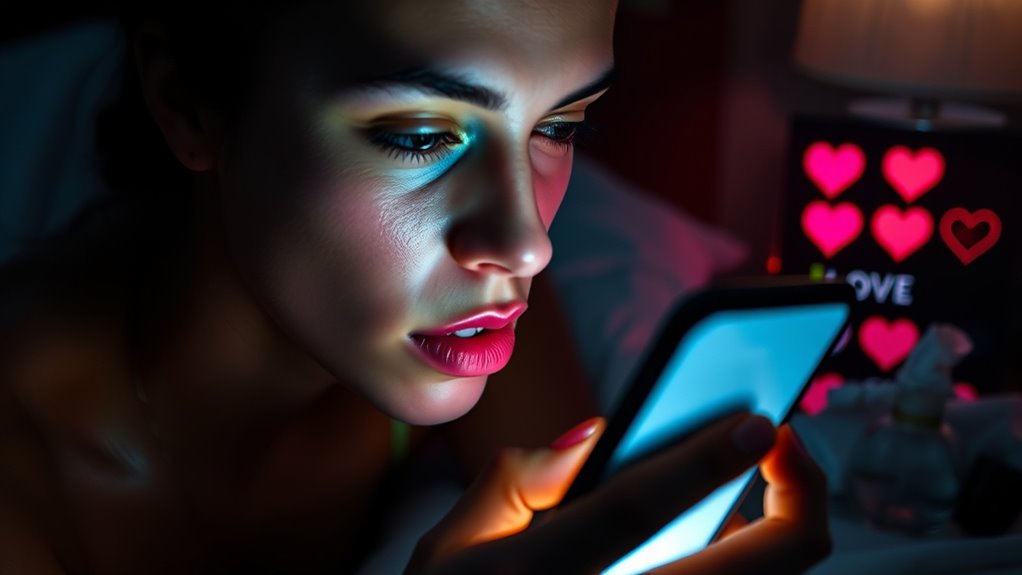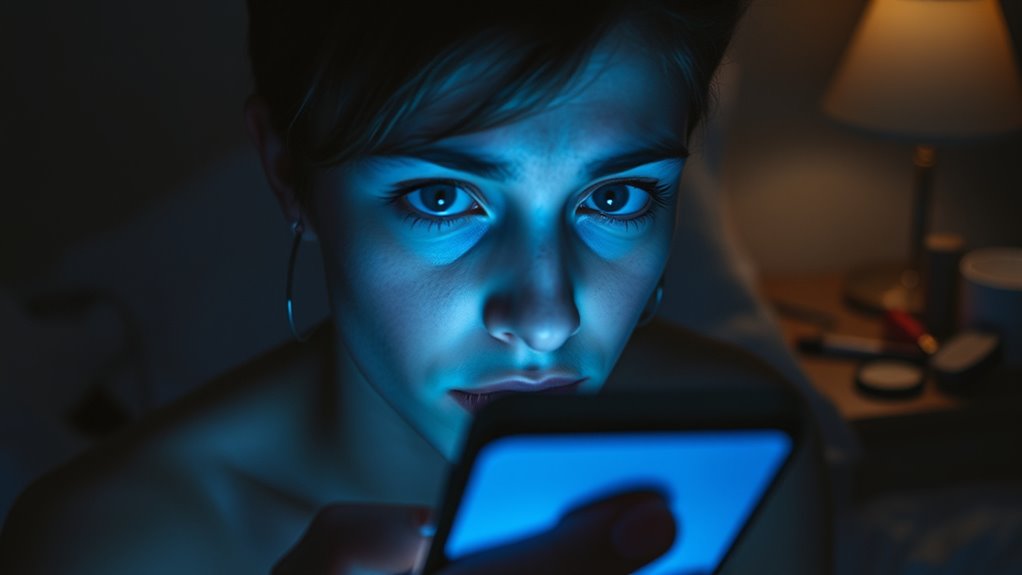Social media fuels love addiction by making you chase constant validation online. You seek approval through likes, comments, and shares, which become your measure of self-worth. Now, your mood depends on digital feedback, and your inner confidence weakens. You may struggle to find genuine connections, as online validation takes priority over real intimacy. If you keep exploring, you’ll discover how social media impacts your self-esteem and relationships more deeply.
Key Takeaways
- Social media fosters dependency on likes and comments as external validation, fueling love addiction and emotional reliance.
- The pursuit of online approval distorts self-perception, making validation a primary source of self-worth and love.
- Constant notifications and feedback loops encourage obsessive behaviors, reducing genuine emotional connections.
- Validation-seeking on social platforms can lead to anxiety, insecurity, and difficulty forming authentic, meaningful relationships.
- Digital obsession with validation erodes self-confidence and hampers the development of true intimacy beyond online interactions.

In today’s digital age, social media has transformed how people seek connection and validation, often blurring the line between healthy relationships and addiction. When you constantly check your notifications or obsess over likes, you’re engaging in a digital obsession that can deeply affect your self-esteem. This relentless need for approval from online audiences can make you feel valued only when you receive positive feedback, creating a fragile sense of self-worth that depends heavily on external validation. Over time, this can lead to a cycle where your mood fluctuates based on the number of likes or comments you get, fueling a dependency on social media for emotional reassurance.
This digital obsession can distort how you view yourself, making you increasingly reliant on external affirmation rather than inner confidence. When your self-esteem is tied to your online presence, you’re more likely to chase validation through likes, comments, or even romantic interactions that are mediated by screens. It’s easy to get caught up in curating the perfect image, constantly comparing yourself to others, and seeking approval that may never truly satisfy you. As a result, your self-worth becomes vulnerable to the ever-changing algorithms and the fickle nature of online praise. This can create a distorted perception of reality, where your value feels dependent on how many people engage with your posts, rather than your intrinsic qualities. Additionally, the resale value of some digital interactions and online personas can influence how much effort people put into their social media presence and validation-seeking behaviors.
The impact on your self-esteem can be profound. Instead of feeling secure in who you are, you might find yourself obsessing over every post, every comment, or every interaction that confirms you’re liked or accepted. When validation isn’t instant or enough, you may experience feelings of inadequacy, anxiety, or even depression. The more you seek validation online, the more you might feel disconnected from your authentic self, as you prioritize crafting a perfect digital persona over genuine self-expression. This cycle not only deepens your love addiction but also weakens your overall self-image, making it harder to develop healthy, meaningful relationships outside of social media. Ultimately, your digital obsession can subtly erode your confidence, leaving you craving constant affirmation and struggling to find genuine love and connection beyond the screen.
Frequently Asked Questions
Can Love Addiction Caused by Social Media Be Treated Effectively?
Yes, love addiction caused by social media can be treated effectively. You should set clear digital boundaries to limit your online interactions and reduce dependency. Offline therapy, especially cognitive-behavioral therapy, can help you understand underlying issues and develop healthier relationship patterns. Combining these approaches allows you to regain control, build self-esteem, and foster genuine connections without relying solely on validation from social media.
How Does Social Media Influence Emotional Dependency in Relationships?
You might not realize it, but social media subtly deepens your emotional dependency through virtual validation and emotional tethering. Every like or comment becomes a tether that keeps you hooked, fueling your need for constant affirmation. This creates an unbreakable loop, making you crave more connection and validation online. Over time, this dependency can distort your perceptions of love and intimacy, keeping you emotionally reliant on digital interactions rather than genuine connection.
Are Certain Platforms More Linked to Love Addiction Than Others?
You’ll find that certain platforms, like Instagram and TikTok, are more linked to love addiction because of their high user engagement and visual focus. These platforms encourage constant validation-seeking and comparisons, fueling emotional dependency. Compared to others, their design promotes rapid interactions and dopamine hits, making it easier to chase validation online. So, if you notice increased emotional dependency, it’s likely tied to the platform’s engagement style.
What Are Signs That Social Media Is Fueling Love Obsession?
You might notice digital obsession creeping in when you constantly check social media for validation craving, feeling anxious if you don’t get enough likes or comments. Signs include obsessively stalking profiles, feeling jealous or insecure, and prioritizing online interactions over real-life connections. If your mood depends on online approval or you find yourself lost in endless scrolling for validation, social media is fueling your love obsession more than you realize.
How Can Individuals Break Free From Social Media-Driven Love Addiction?
To break free from social media-driven love addiction, start with a digital detox by setting specific times to disconnect. Practice mindfulness exercises to stay present and recognize your emotional triggers. Limit your social media usage and focus on real-life connections. By creating boundaries and cultivating self-awareness, you regain control over your feelings and reduce dependency, helping you find healthier ways to seek validation and build genuine relationships.
Conclusion
As you navigate social media, remember that nearly 70% of users admit to seeking validation online, which can fuel love addiction. It’s easy to get caught up in chasing likes and comments, but recognizing this pattern is key to maintaining healthy relationships. By staying aware of how social media influences your emotions, you can enjoy genuine connections without losing yourself in the endless pursuit of digital validation. Take control and prioritize real-life love over online approval.









